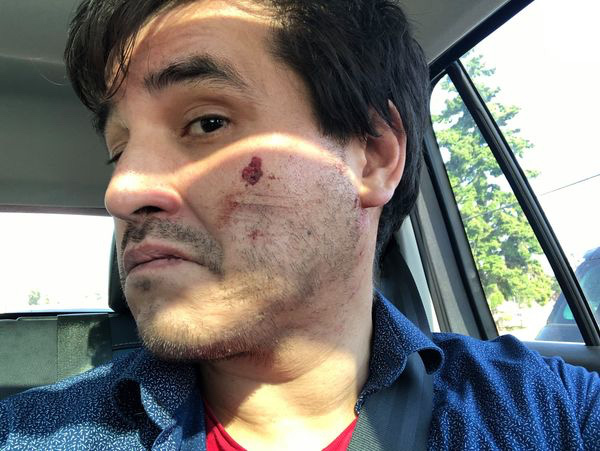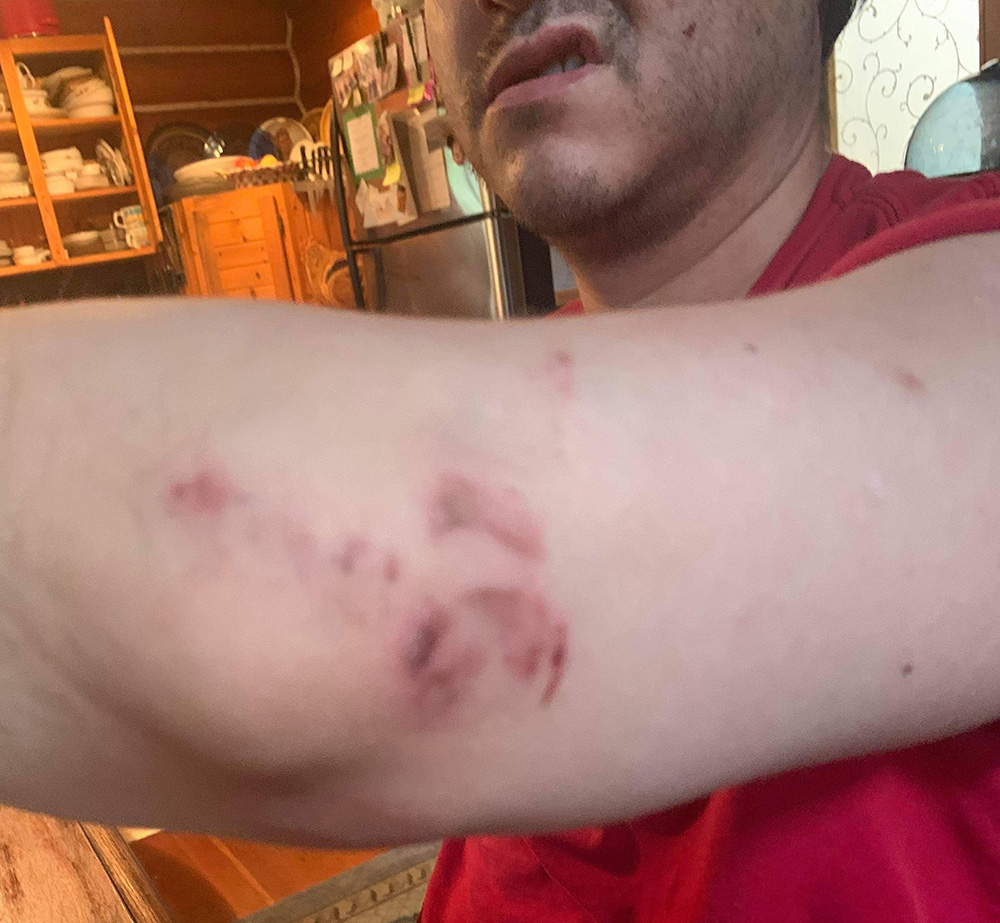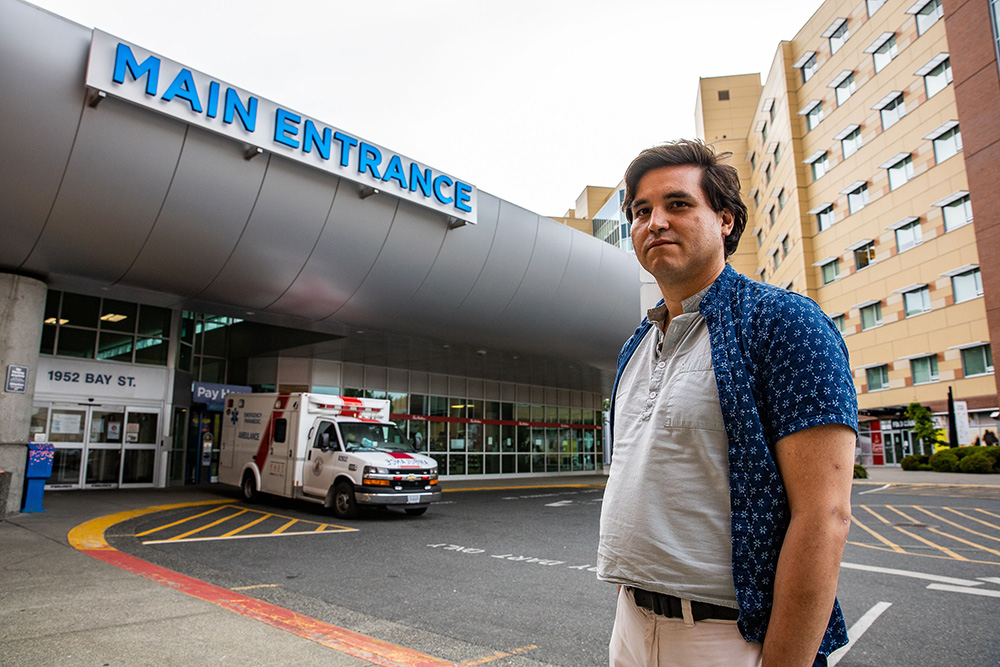[Editor’s note: Descriptions of physical violence in this story may be disturbing for some readers.]
Tawnee Chipps knows pain and the hopelessness it can bring. For more than a year, he’s suffered the physical and mental toll of an antibiotic-resistant infection.
His case of methicillin-resistant Staphylococcus aureus, or MRSA, caused debilitating pus-filled cysts to dot his body, making social connections and his past work in a post-secondary institution even more difficult during the pandemic.
At its largest, one on his neck measured three centimetres in diameter. The cysts on his neck, underarms, back and chest brought Chipps and his wife, who also became infected and developed similar abscesses, to tears on multiple occasions.
But Chipps, a member of Sc’ianew First Nation in East Sooke on Vancouver Island, said he hadn’t feared for his life until hospital security guards assaulted him as he begged for treatment at the Royal Jubilee Hospital in Victoria.
Chipps said that on the morning of June 30 he was in intense pain from MRSA, which had persisted despite multiple rounds of different antibiotics over the previous 13 months. His family doctor had advised him that whenever the infection and pain flared, he should go to the emergency room for admission, pain relief and a new type of antibiotics. He’d already followed the advice twice.
Chipps waited three hours in the ER to see a doctor, who he said seemed preoccupied during the physical examination and abruptly left the room.
A nurse told him to stay in the waiting room again, where the doctor soon informed Chipps she couldn’t do anything for him at the moment and he should go home and wait for a specialist to call him the following week.
Chipps said that without raising his voice or using offensive language, he asked for further detail about when and how the specialist would contact him, what else they could do for him, and why they could not admit him to get a second opinion.
He had barely gotten a single response, Chipps said, when the nurse called security to remove him.
Two guards arrived, Chipps said, and wrestled him to the floor. One guard placed a knee on his neck, he said, causing waves of pain from his infection to shoot through his body as he was pushed into the ground.
As the other guard handcuffed him, Chipps said he struggled to breathe but didn’t resist. He said he heard his laptop smash as his backpack crashed to the floor.

“I cannot breathe, get your fucking knee off my neck now,” Chipps recalls pleading.
The rough physical contact sent Chipps into shock. He said he could barely comprehend what was happening. “All that was going in my head was a big giant ‘No!’”
The guards let up when Chipps was able to shout he couldn’t breathe.
The pressure alleviated, and after the guards threatened to call the police, they marched him to the bus stop outside. Chipps said he was scraped, bruised and in more pain than he had been when he arrived.
It was a lonely wait for his wife to pick him up and bring him home, Chipps said.
He’s speaking out because he doesn’t want other Indigenous people to feel alone in the racism they face seeking health care. “It’s not fair that something should have to happen to me before anything changes.”
Chipps said the hospital’s aggressive response was an example of the widespread anti-Indigenous racism in the health-care system.
He is calling for broader accountability and compassion at the Royal Jubilee Hospital and the return of health-care resources to First Nations communities across B.C. so they can lead culturally safe and competent care for their people.
“I’m not interested in having somebody fall on their sword,” said Chipps in an interview. “I want the whole system to be more compassionate.
“If we don’t take responsibility and step up, not just for these mistakes, we're gonna lose this health-care system we once prized, and we’re gonna lose these people.”
In a response to emailed questions from The Tyee, an Island Health spokesperson said the authority cannot discuss individual cases due to privacy concerns but confirmed VIHA is aware of Chipps’ formal complaint.
“Island Health is committed to embedding cultural safety and humility in the delivery of health and care for Indigenous people,” read the statement.
Calling security should not be the first choice, but “staff may seek support from Protection Services to take appropriate steps to ensure a safe environment for everyone involved.”
‘I was polite, I was not violent, and it really didn’t matter to them’
The alleged mistreatment took place a year after the provincial government launched an independent investigation into anti-Indigenous racism in B.C.’s health-care system.
The results, detailed in the “In Plain Sight” report released last November, found widespread and insidious racism against Indigenous people permeated every corner of health care in B.C., driving Indigenous people away from seeking care and resulting in poorer outcomes than non-Indigenous patients when they did.
In it, 26 per cent of Indigenous patients said they felt not at all safe when interacting with staff, including security staff. A number of Indigenous respondents also reported having security called on them when they were mistaken for being intoxicated or perceived as being difficult.
In August 2020, Island Health mandated all staff, including physicians and nurses in emergency departments, to complete cultural safety training.
All security staff for the health authority must complete training that includes cultural safety and humility topics, a spokesperson said in an emailed statement, as well as non-violent intervention and tactical communication.
Protection Services Officer’s “undertake the least restrictive and most compassionate approach possible when dealing with abusive or aggressive situations,” said the statement.
All incidents where force is used are reported and reviewed internally, the statement said, but the reports are not made public.

Under renewed broad public attention, racist and traumatizing experiences have continued in the 14 months since the investigation began and the nine months the province has been starting to implement its recommendations.
Chipps’ experience spanned a number of common racist patterns detailed in the report, from dismissal of his pain, to perceiving his self-advocacy as non-compliance, to considering Indigenous men more violent or threatening than non-Indigenous men or less deserving of care.
“I am an Aboriginal man and am aware of how Aboriginal people are often not taken seriously by hospitals and are refused much-needed treatment,” said Chipps in a formal written complaint to the Vancouver Island Health Authority Patient Care Quality Office, reviewed by The Tyee.
“I was polite, I was not violent, and it really didn’t matter to them,” he said in an interview.
Experiences like Chipps’ are not uncommon for Indigenous people in Victoria, said Grant Mackenzie of the community support centre Our Place.
About 30 per cent of the centre’s clients are Indigenous and have faced mistreatment and racism that discourages them from seeking care and worsens health problems, he said.
“We certainly see a lot of people who don’t trust hospitals because of how they’ve been treated,” said Mackenzie. “It’s not as easy for [Indigenous people] to access the type of care a Caucasian could access.”
Emergency hospital staff are stretched thin, especially during the pandemic, he said.
Mackenzie said they’re also dealing with patients whose main problems — like being unhoused or criminalized because of their substance use — stem from colonization. Hospitals aren’t equipped to deal with these issues, and health-care workers can become fatigued while trying or have their compassion eroded.
“When some people get that burnout, those inner dark thoughts and racism can surface more often,” said Mackenzie.
Those experiences, in turn, contribute to prejudice that affects all Indigenous people seeking care, he added.
Long before the report codified the evidence and impacts, Chipps witnessed the devastation of racism on the health of people within his community and others. Several Indigenous friends have also sought care at Royal Jubilee Hospital and been turned away or mistreated, he said.
Chipps has been to hospital or a doctors’ office about 10 times in the last year for his illness, he said, and “every visit to the hospital is an opportunity for future trauma.”
“Sometimes obstacles just feel like a brick wall,” said Chipps. “And for that person at that time, the lack of care, the lack of understanding, the assumptions made about her have had an impact on our lives for all the future.”
Chipps is awaiting the first formal hearing on his complaint at the end of September.
The complaints process is a focal point of the recommendations for change put forward by the “In Plain Sight” report. Patients are often discouraged from filing a complaint, or fear that complaining could result in health-care providers retaliating if they have to return for care. Those that do complain are left to navigate a slow and often re-traumatizing process.
Chipps is asking for a full apology and action items to ensure MRSA care improves and no one, Indigenous or not, faces this kind of treatment again. He has also filed a separate request for compensation.
Chipps said racism clouds people’s ability to be compassionate. Compassion needs to be encouraged and individuals held accountable to that standard to end the poor treatment of Indigenous people, he says.
Anyone in that waiting room with a clear head could see he was in pain and needed help, not removal, Chipps said. “I know our system needs to be more accessible and compassionate, and it’s not just down to individual workers.”
Now, he turns towards healing. It has been a period of intensified grief for Chipps as his family and father, a shaman and a residential school survivor, reckon with new confirmations of more than 1,300 unmarked graves of Indigenous children at state-funded and church-run residential schools.
The two have found strength in each other, in ceremony, in working together on Hul'q'umi'num' language revitalization in their community.
“This is your time to think and process and let it go, and then find the energy to keep pushing forward with these meetings and these conversations,” said Chipps. ![]()
Read more: Indigenous, Health, Rights + Justice
















Tyee Commenting Guidelines
Comments that violate guidelines risk being deleted, and violations may result in a temporary or permanent user ban. Maintain the spirit of good conversation to stay in the discussion.
*Please note The Tyee is not a forum for spreading misinformation about COVID-19, denying its existence or minimizing its risk to public health.
Do:
Do not: